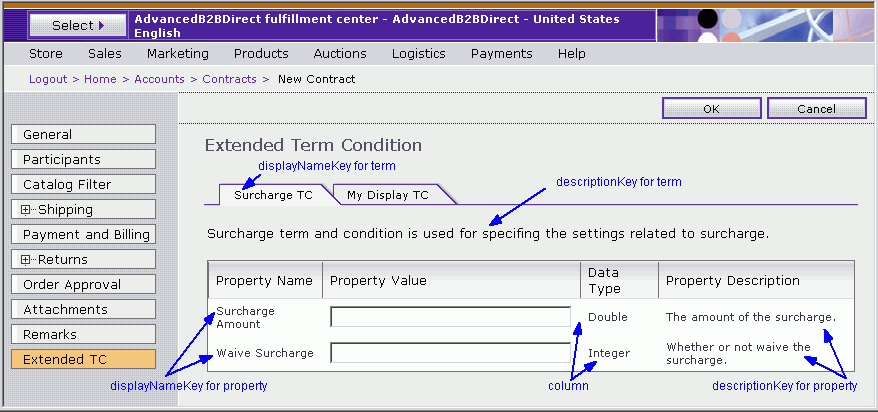
TCConfiguration.xml file
The following table provides details for the attributes that you can use to define new term types within the TCConfigurationExt.xml file.
The following code is an example of a TCConfigurationExt.xml file that
defines new term
types:
<TCConfiguration
xmlns="http://www.ibm.com/xmlns/prod/commerce/9/contract"
xmlns:ecore="http://www.eclipse.org/emf/2002/Ecore"
xmlns:oa="http://www.openapplications.org/oagis/9"
xmlns:xsi="http://www.w3.org/2001/XMLSchema-instance"
xsi:schemaLocation="http://www.ibm.com/xmlns/prod/commerce/9/contract
TCConfiguration.xsd"
resourceBundle="contract.customTCRB">
<TCDefinition
type="SurChargeTC"
existing="false"
usage="Contract"
display="true">
<Display
displayNameKey="SurChargeTC"
descriptionKey="SurChargeTCDescription"/>
<Property
name="waiveSurCharge"
column="INTEGERFIELD1"
required="true"
changeable="true">
<Display
displayNameKey="waiveSurCharge"
descriptionKey="waiveSurChargeDescription"/>
</Property>
<Property
name="surChargeAmount"
column="FLOATFIELD1"
required="false"
changeable="true">
<Display
displayNameKey="surChargeAmount"
descriptionKey="surChargeAmountDescription"/>
</Property>
</TCDefinition>
</TCConfiguration>
| Attribute | Purpose |
|---|---|
resourceBundle |
Location of the resource bundle that contains the literal values for the information that is displayed in the user interface. The first part of the name indicates the namespace, such as contract. The second part is the name of the resource bundle property file, such as customTCRB. |
type |
Unique identifier for the term. The value of the type attribute for the
TCDefinition element must not be TermCondition or the same as
subtypes of existing terms. |
existing |
This element is a true or false value that indicates
whether the term is an existing term or not. Always create new terms with the value set to
false. Setting the value to true means that this term is being
modified by adding more properties to it. The existing implementation, by EJB bean, must be modified
or extended to handle the new properties. The default value is false. |
usage |
The Account, or Contract, or All value for
this element indicates whether the type of term applies at the Account or Contract level, or both.
This setting is applicable only when the existing field is set to
false. |
display |
This element is a true or false value that controls whether
HCL Commerce Accelerator displays this term. The default value is true,
which indicates that the term displays. |
displayNameKey |
Key to the resource bundle for HCL Commerce Accelerator to get the display value for
the name of the term or property. For example, the SurCharge is the key if the
resource bundle has the following content:
|
descriptionKey |
Key to the resource bundle for HCL Commerce Accelerator to get the display value for
the description of the term or property. For example, the 'SurChargeTCDescription' is the key if the
resource bundle has the following content:
|
name |
Unique identifier for the property. Ensure that the name is unique inside a term. However, different terms can have the same property name. |
column |
The column identifier within the TERMCOND table that holds the value for this property. For the supported columns, see Supported columns. |
required |
This element is a true or false value that indicates
whether the value of this property is required. If it is true, the extended term
can be saved unless the value of this property was provided. The default value is
false. |
changeable |
This element is a true or false value that indicates
whether this property is changeable after the contract is deployed and in Active
state. The default value is false. For the changeable flag to have an effect at the property level, the term as a whole must be changeable. Therefore, first you must ensure that the CHANGEABLE column of the TERMCOND table for this term is set to 1. 0 means no, 1 means yes. |
